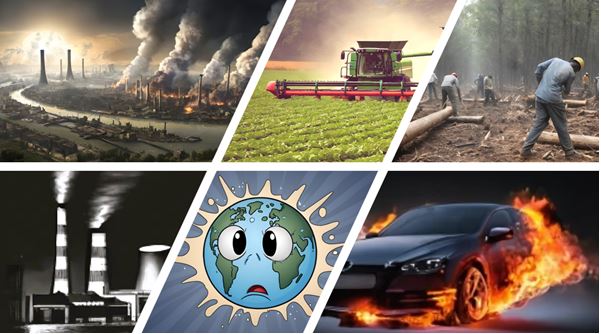Climate Change: Geo-political Implications & A New Global Diplomacy
Climate change is no longer a prediction of an upcoming threat or a futuristic sci-fi comic. It is one of the pressing issues already happening and impacting humanity today. The Earth continues to warm, and the intense implications are already evident. Some events, which were only seen in scientists’ opinions or research papers in the 1970s, are happening now: loss of sea ice, melting glaciers, rise in sea level, uneven rainfall, intense heat waves, weather anomalies, and species extinction, to name a few. Some of these unfortunate implications are transpiring faster than anticipated.
What is Climate Change?
Climate change generally refers to a persistent alteration in temperature and weather patterns on the planet, typically caused by natural phenomena such as solar activity or volcanic eruptions. However, from the 18th century onwards, the causes have shifted away from natural factors. The primary contributor to global warming and its adverse effects on the climate is now man-made, namely the industrial revolution.
The average temperature of the Earth is now 1.1 degrees Celsius higher than it was in the 18th century. All species on Earth have just endured the hottest decade on record (2010-20).

Environmental Implications:
- Rising Global Temperature (Rose 1.1 Deg average in last 100 Years)
- Sea Level Rise (Seal level rising by 3.2 mm/Year compared to 1.7 mm/Year in the 1990s)
- Shrinking Glaciers (Average reduction of 60 feet in thickness since 1980)
- Reducing Sea Ice (40% is Reduced since 1979)
- CO2 Gas percentage in atmosphere has increased by 25% since 1958.
- Increase in Floods & Droughts have become common.
- Decreasing reliability on Snow-pack for fresh water
- Increase in heat related health issues.
- Rising heat impact on food stocks.
- Adverse infliction on ecosystem, even inducing extinction of species.
- Ocean water is turning acidic due to rising absorption of atmospheric CO2 & Marine life is brutally affected.
Geo-political Implications:
The climate crisis becomes gloomier and grimmer with each passing day, as does the politics surrounding it. Inter-governmental cooperation is currently painted with mixed colors, while the clock ticks and Armageddon races toward humanity and all other inhabitants of Earth, including thousands of innocent species coexisting with humans.
The Paris Agreement has been signed and ratified by 196 countries at COP-21, making them legally bound to the international treaty on climate change. The treaty aims to reduce the global temperature and hold it below 2 degrees above pre-industrial levels, while also restricting global warming to 1.5 degrees. The treaty asks for massive social, economic, and industrial transformations, requiring accelerated efforts from all parties to the treaty.
The treaty entails NDC (Nationally Determined Contributions) & Long-Term Strategies, that fixes vision & direction towards the end goal.
Failure of Paris Treaty:
- Last 10 Years are the warmest in the recorded history. The treaty has failed to limit global warming to 1.5 degrees (not even 2 degrees).
- The treaty has not been able to phase out fossil fuel equitably, which is a primary contributor to global warming.
Solutions:
- The developed nations must contribute more financially, to drive the process & achieve the NDCs in Paris treaty.
- Developing nations must prepare feasible plans for renewable energy generation & commission them and slowly phase out thermal power plants.
- Developed nations must inject more funds towards research and development to invent cleaner & greener technology for energy needs.
- A new global fossil fuel treaty must be signed to supplement the existing Paris agreement.
- All the countries must plan & pre-pone Net Zero Target Year to 2050.
- Increase of transportation & travel by electric vehicles.
- Restoration of nature by plantation & forest generation.
- Protection of existing forests.
- Reduction in the use of plastics.
It is easy to be intimidated by the impacts and grim picture of climate change. But humanity already knows the answer to this existential threat. It requires strong inter-governmental cooperation, support from corporations, and individuals adopting changes in their habits. Individuals should consider that they make governments and support corporate operations. Therefore, demanding actions for a healthy planet makes sense.
Global Diplomacy on Climate Change:
Effective global diplomacy plays a crucial role in addressing the challenges posed by climate change. Diplomatic efforts wield significant soft power, shaping both international and national agendas. Since the aftermath of World War II, the world has seen numerous successful initiatives and achievements driven by multilateral and bilateral diplomacy, such as the establishment of the IAEA, UNCLOS, World Trade Mechanism, Fight with COVID or the reconstruction of Post-war Europe.
Now, the focus must shift to climate diplomacy. The strength of initiatives like the United Nations and the Paris Climate Treaty hinges on the collective political will and diplomatic efforts of all member nations. Enhancing the Paris treaty with a global negotiation mechanism would address ambiguities and financial requirements, bolstering its effectiveness.
Climate change demands urgent attention comparable to nuclear non-proliferation, bio-weapon suppression, or global asteroid tracking. Effective climate diplomacy necessitates robust governmental support alongside active engagement from corporate entities, citizen groups, and private initiatives.

3 thoughts on “Climate Change: Geo-political Implications & A New Global Diplomacy”